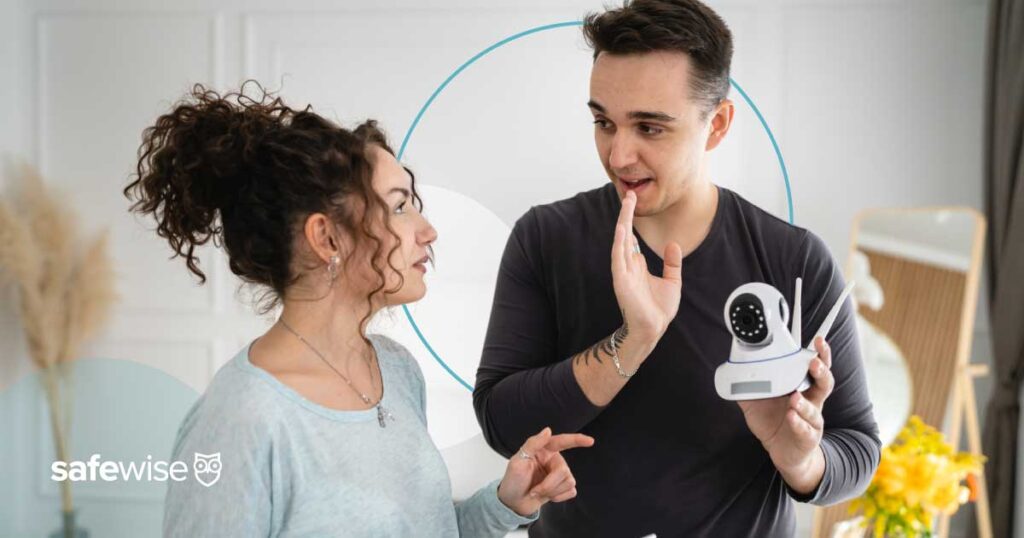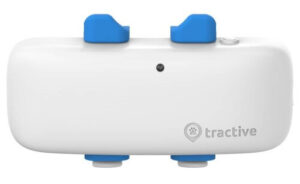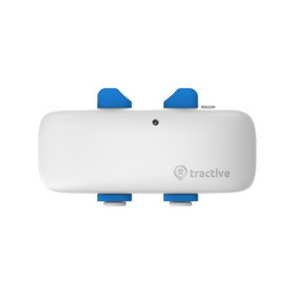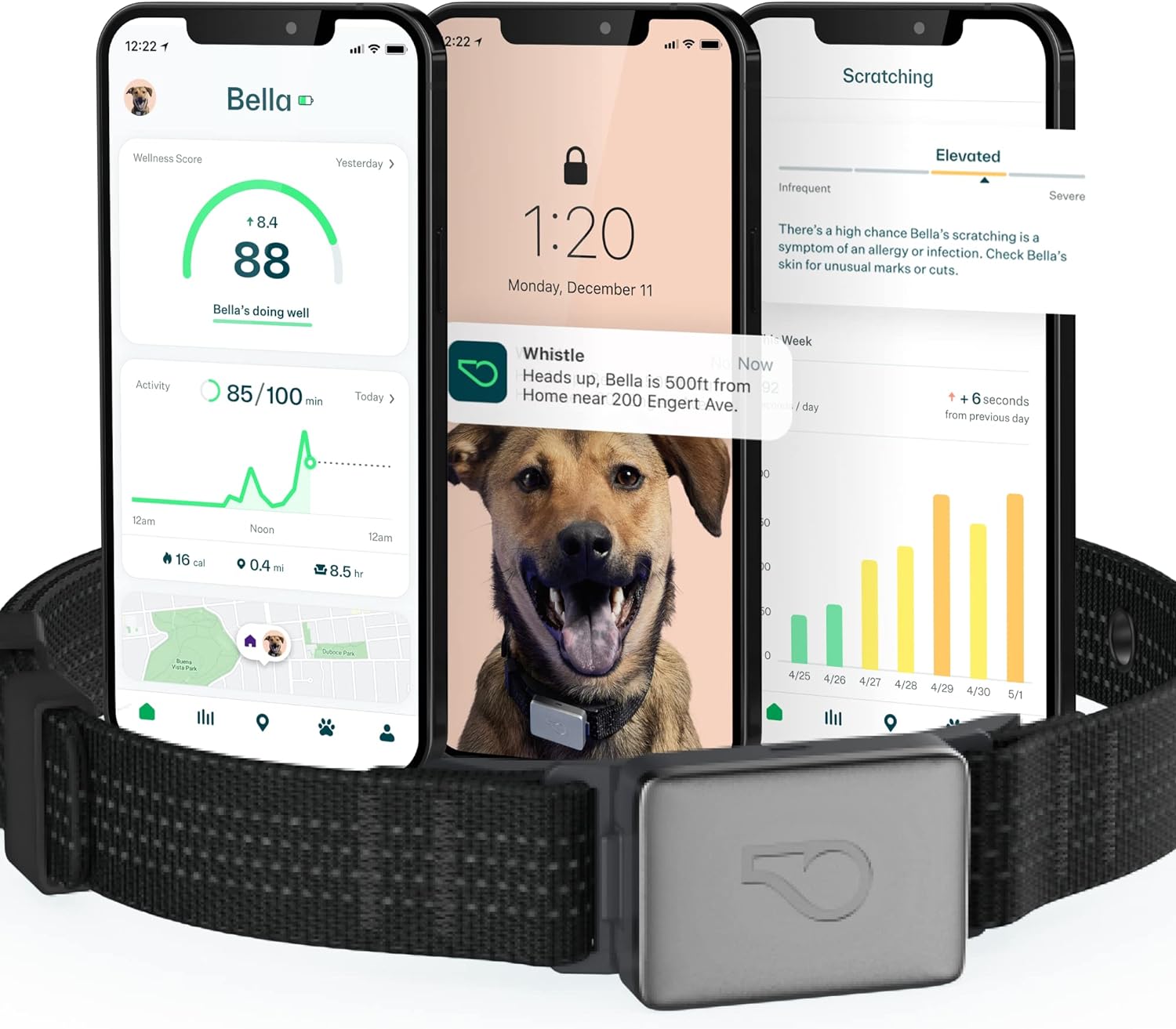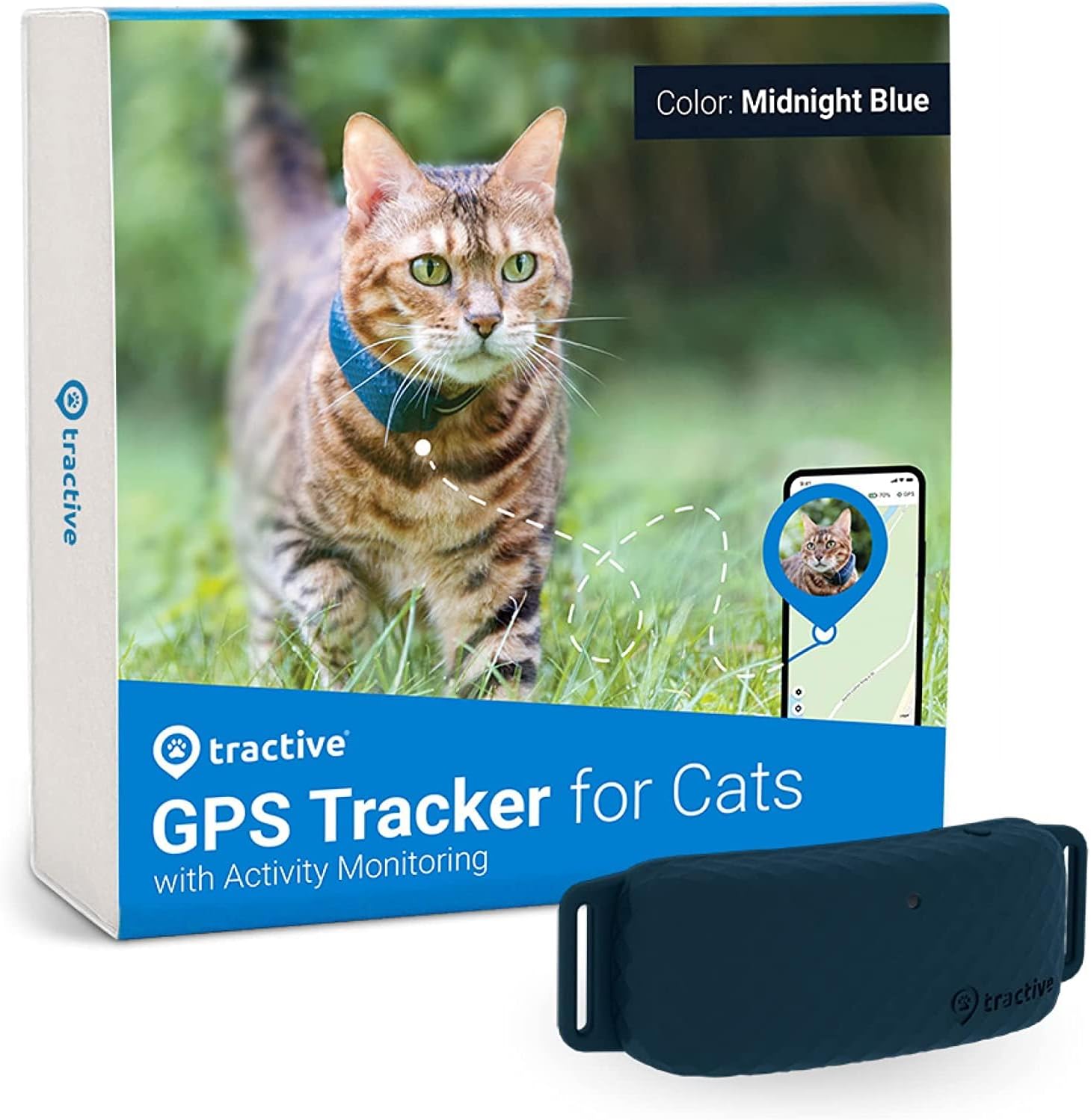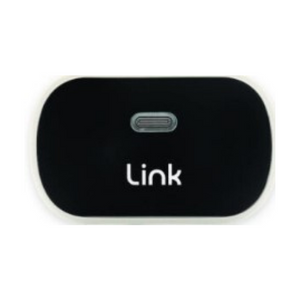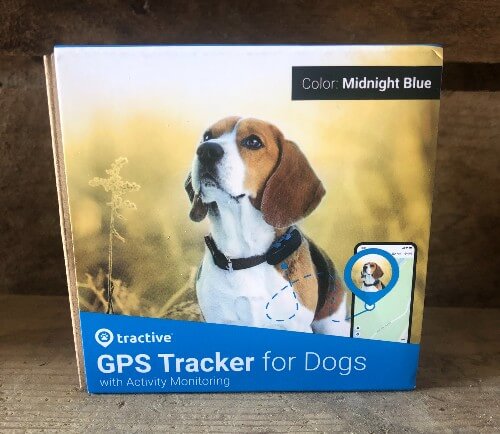We tested the Tractive GPS Pet Tracker by strapping it to a working farm dog named Kiki. The Tractive showed a complete history of Kiki’s wanderings and where she spent most of her time. Tractive’s Live AR mode is impressive, but its audio tracking and Find Mode need a bit of work. That said, this is a great pet GPS tracker for the money, and we loved every other feature.
Tractive GPS Pet Tracker Review
SafeWise experts have years of firsthand experience testing the products we recommend. Learn how we test and review.
Meet Kiki the test dog
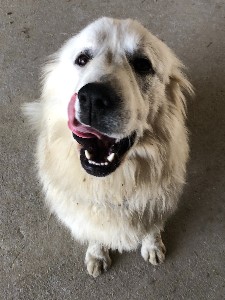
By all accounts, calling Kiki a “working” farm dog seems like a stretch. She barks. She sleeps. She repeats. This two-year-old Great Pyrenees is always snoozing in the horse barn, but she has a history of disappearing now and then. Her owner wanted to know where she goes—especially at night, when Kiki’s supposed to be scaring coyotes away from the farm.
By tracking her with Tractive, we discovered that Kiki has a very good reason to sleep all day—she logs over five miles of activity at night by roaming around the farmhouse and barn. She also darts over to neighboring houses occasionally, but her owner is relieved that Kiki doesn’t venture far away.
Let’s dive into all of Tractive’s features and how it performed during testing.
Tractive versus other pet GPS trackers
At around $50 upfront and up to $13 a month, Tractive is the most affordable pet GPS tracker we recommend. You can get a few extra features from competitors, but Tractive has all the basics you need to find your missing pet or track their daily activity.
The Whistle Go Explore kicks things up a notch by detecting activities like licking, scratching, and drinking, which can give you even more clues into your pet’s changing health.
Tractive also doesn’t have any training features, which is Link’s claim to fame. It also doesn’t have Link’s temperature sensor.
Compare Tractive to the competition
Amazon.com price as of post date. Offers and availability may vary by location and are subject to change. Read full disclaimer.
Tractive’s GPS history works well
Tractive shows your pet’s GPS history as lines on a map or as a heat map. You can toggle the lines or hotspots on and off by tapping the tri-fold icon.
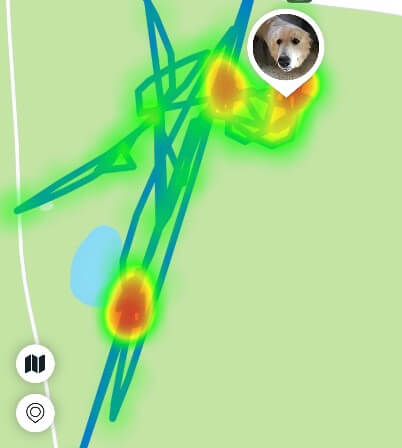
Screenshot: Cathy Habas, SafeWise
The trace lines are perfect for learning where your outdoor cats and dogs go, while the heat maps help you understand where your pet spends the most time.
The screenshot shows Kiki’s morning activity. We can see that she spent most of her time around the barn, escorted the horses up from the field, checked on the farmhouse and neighbors, and even snuck in a snooze by the pond.
Use the slider to go back in time and trace the exact route your pet took, or to see where they were at a specific time.
Sometimes slow to update
Kiki’s location history did get stuck for two hours on the afternoon of Day 2. It showed her in the same spot in the barnyard for a solid two hours, which didn’t seem right. All of her other data shows that she paces around quite a bit.
I texted Kiki’s owner to make sure she was still wearing the Tractive—she was. I did a hard refresh on the app, and her location updated about a minute later. But the data from that two-hour time span wasn’t recovered.
Great for tracking and sharing walks
You don’t need to live on a farm or have an escape artist pet to use Tractive. Its location history lets you document and share walks with your furry friend. From the History section, just tap the Share icon in the upper right corner. You can save a photo of the route shape on top of a satellite image or a plain background.
The distance and time also appear at the bottom of the screen.
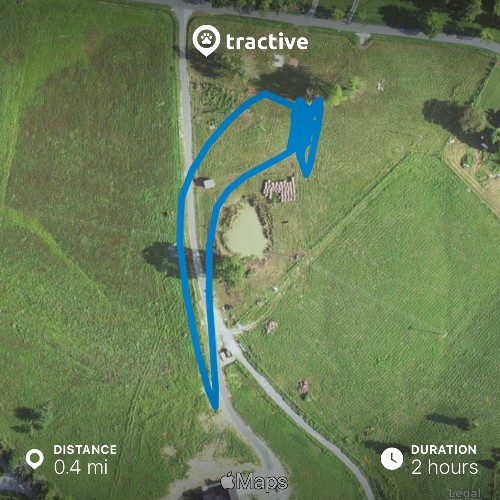
Screenshot: Cathy Habas, SafeWise
Location accuracy slightly off
I already had the Tractive on and ready to go when I drove to Kiki’s farm. Tractive traced my route in the app, but the lines didn’t match the roads visible on the satellite view. Instead, they skewed to the southeast about 50 feet.
I kept this in mind when evaluating Kiki’s movements—I know she didn’t actually walk straight through the pond, for example. In more crowded areas, it might be tricky to know whether your pet is in your yard or the neighbor’s. This also could create some false alarms if you set up geofences and your pet toes the line.
There’s a map setting called “Show Location Accuracy” that displays a circle around your pet’s icon. Your pet could be anywhere within that circle. Toggle it on by tapping Map and then the tri-fold icon.
Live Mode helps find lost pets
If your pet’s missing, switch from passive tracking to Live Mode. In addition to updating the tracker’s location every two-to-three seconds, Tractive shows you its speed, distance, and altitude.
Live Mode also gives you four options to help you find your lost pet:
- Directional cues
- Audio cues
- Find Mode
- Nightlight
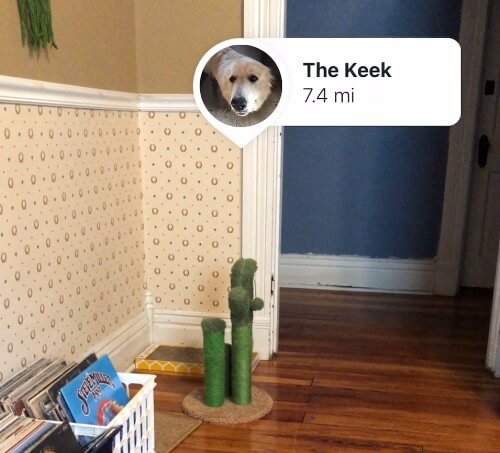
Kiki is 7.4 miles thataway.
Screenshots: Cathy Habas, SafeWise
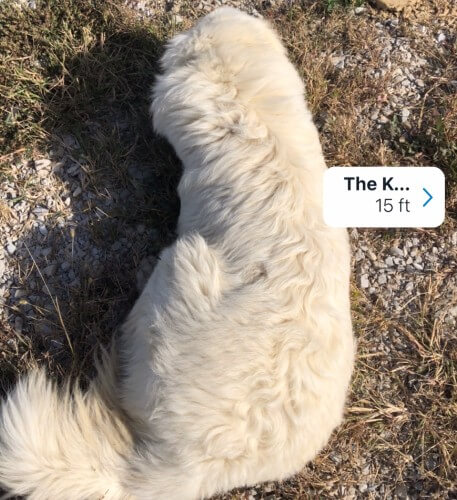
Kiki is not 15 feet to the right.
The directional cues and nightlight were the most useful features. Once you turn on Live Mode, tap the AR cube in the bottom right corner. Your camera will turn on and you’ll see a little box floating on your screen. The box shows the direction you need to travel and how far you need to go to find your pet.
If the box appears to the left or right of your screen, keep turning in that direction until the box moves to the center. Then you know your pet is straight ahead.
I tried this at home while Kiki was back at the farm. It showed me I needed to travel 7.4 miles southeast to find her, and I was glad to see it worked over a long distance.
However, when I was right on top of Kiki, it said I needed to go 15 feet to the right. Clearly, that wasn’t true—but this margin of error is on par with other GPS trackers.
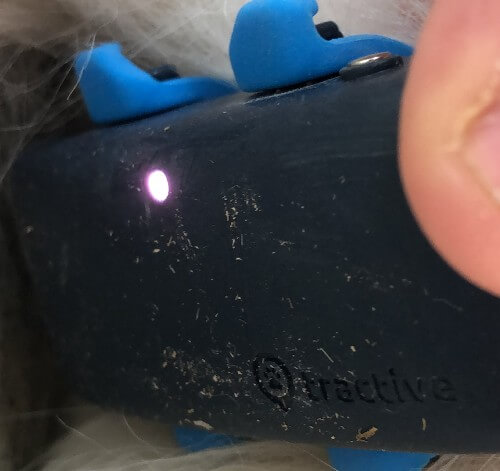
Image: Cathy Habas, SafeWise
Tractive’s audio cues were disappointing. It took a while for the Tractive to start beeping after I turned on audio tracking, but the app does warn you it can take up to a minute. The beeps were so faint and high-pitched that I could barely hear them unless I stood right next to Kiki.
The Find Mode feature was also a bummer. It fills up the rings of a bullseye to tell you when you’re getting closer to your pet. Trouble is, I had to be within about five feet of Kiki for it to tell me I was heading in the right direction. And even when I was right on top of her, the app made it seem like I was still too far away.
The night light comes in handy if your pet runs off at night, but it’s puny. And because Kiki has a luxurious mane, some of her fur covered the light. (I know, Kiki, it’s tough to be so beautiful!)
Tons of geofencing options
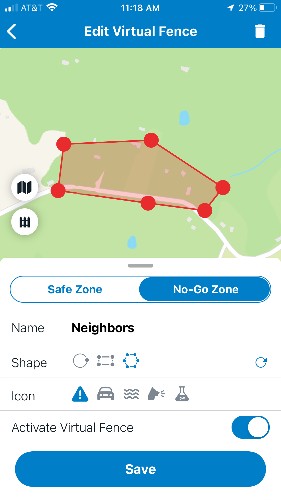
Screenshot: Cathy Habas, SafeWise
Tractive does geofencing right. Where other apps often limit you to circular boundaries, Tractive lets you create custom boundaries in squares, circles, or abstract six-sided shapes and label them as a Safe Zone or a No-Go Zone.
No-Go Zones are outlined in red on the map, while Safe Zones are outlined in green.
The smallest geofence you can create is about 100 feet in diameter.
You’ll get push notifications when your pet enters or leaves any of these areas. Make sure you enable push notifications for Tractive in your phone’s settings. You can also toggle the kinds of notifications you want to receive in the Tractive app by tapping Account and Notifications.
Activity and sleep monitoring show valuable insights
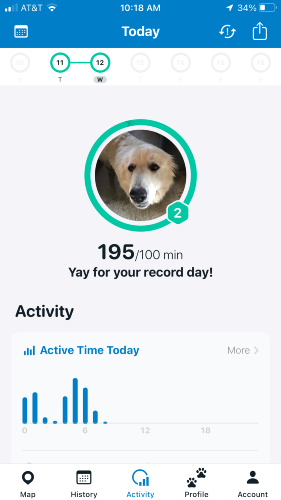
Screenshot: Cathy Habas, SafeWise
Activity monitoring turns the Tractive into a FitBit for pets. You can even earn badges and compete for bragging rights among other local pets on the leaderboard.
You’ll see how many minutes your pet is active, how many calories they burn, and how their data compares to their breed’s average.
There’s also a surprising amount of sleep-tracking data available with the Tractive. You’ll see how much time your pet spends asleep during the day vs. at night, how efficiently they sleep, and—if they’re a dog—how often they are interrupted when asleep. Tractive can also apparently tell the difference between a dog that’s asleep versus a dog that’s calm—you’ll see their “calm minutes” too.
All of this helps you understand whether your pet’s feeling normal, lethargic, or restless. Next time the vet asks if your pet seems to be behaving differently, you’ll have some data to help you pinpoint even subtle changes.
Syncing issues
I ran into a little bit of trouble getting Kiki’s activity data to sync to the app. It said I needed to be close to the tracker so it could sync via Bluetooth, so I went back to Kiki. Sure enough, the data uploaded just fine.
I thought I would have to do that every time, but the next day it updated without issue while I was miles away. And then it went back to not updating. I think this won’t be an issue for most people—but it was a snag in my testing process since Kiki was far away from me most of the time. If your pup goes to daycare, for example, you may not be able to sync their activity data until pick up.
Tractive for cats vs. dogs
Tractive sells a version for cats and a separate design for dogs. Both weigh the same and have the same dimensions, but their collar attachments are different. The Tractive for cats has integrated loops at either end for the collar to slide into, whereas the Tractive for dogs has a removable silicone strap that wraps around the back of the collar.
There are also some color differences: the Tractive for cats comes only in black, while the Tractive for dogs comes in white, blue, and brown.
The app barely changes for cats vs. dogs. The most significant difference is that cats don’t get a sleep efficiency score. For cats, you can also input rib and hind limb measurements for more accurate activity recommendations.
You do have the option to select “other” if you’re tracking neither a dog nor a cat, but you’ll lose all activity monitoring features.
Easy setup
The Tractive pet GPS tracker was a breeze to set up. It needs to charge for at least two hours out of the box, and then it’s ready to go on your pet’s collar.
I didn’t even have to take off Kiki’s collar to put on the Tractive—the silicone strap goes under the collar and easily slides over the tracker’s four nubs. For what it’s worth, Kiki has a rolled leather collar, and the Tractive fits on it just fine.
Setting up the app was also easy-peasy. I scanned the QR code in the Quick Start Guide, downloaded the app, and created an account. The app paired with the Tractive right away—I didn’t even have to put in any serial numbers. It was as effortless as I could’ve hoped for.
The only slightly confusing thing was the charging cord. It has a magnetic component, but that’s not enough to keep it latched onto the tracker. You have to snap the cord onto the tracker. That’s explained in the Quick Start Guide, but if you’re like me and skip that part because “I know how to charge things!” . . . you might end up befuddled.
Final word
The Tractive GPS Pet Tracker had all of the features I wanted for my Kiki testing scenario without making me feel like it was overpriced or stuffed with things I’d never use. Tractive’s location updates were reasonably accurate, its geofencing settings were surprisingly customizable, and the activity monitoring data was insightful.
I recommend spending the extra $12/yr. to get Tractive Premium if you want to share account access or export social media-friendly images of your walking routes.
Tractive FAQ
Your pet is probably sleeping or in a Power Saving Wi-Fi Zone. To prolong battery life, Tractive logs location updates only when your pet moves around or leaves your Wi-Fi area. Turn on Live Mode to get an instant update.
You can also check the Tractive’s battery and GPS connection at the top of the main Map screen to make sure everything’s working properly.
I sometimes ran into trouble with the History tab not updating with the tracker’s latest position. Adjust the timeline to make sure you’re seeing the current location. And if that fails, close out the app and open it again.
Tractive’s battery life isn’t the best in the industry, but it held up during our tests. After running for 24 hours—including about six hours of me constantly poking around on the app for testing—Kiki’s Tractive had 70% battery life.
There are a few caveats to that drop in battery power. First, I forgot to set up a Power Saving Zone using the barn’s Wi-Fi, which would have allowed the battery to last even longer. Second, using the app and repeatedly turning on Live Mode ate into the battery too.
All in all, Tractive’s advertised battery life of “up to 7 days” seems accurate for normal use.
It took about 3 hours for the Tractive battery to charge from 17% to 100%.
You can’t buy Tractive’s Premium subscription on a month-to-month basis. It’s sold only as one-year, two-year, or five-year plans.
The one-year Tractive Premium plan costs $108, which comes out to $9 per month.
The one-year Tractive Basic plan costs $96, or $8 a month. Otherwise, the Tractive Basic plan costs $13 on a no-contract, month-to-month basis.
How we reviewed the Tractive pet GPS tracker
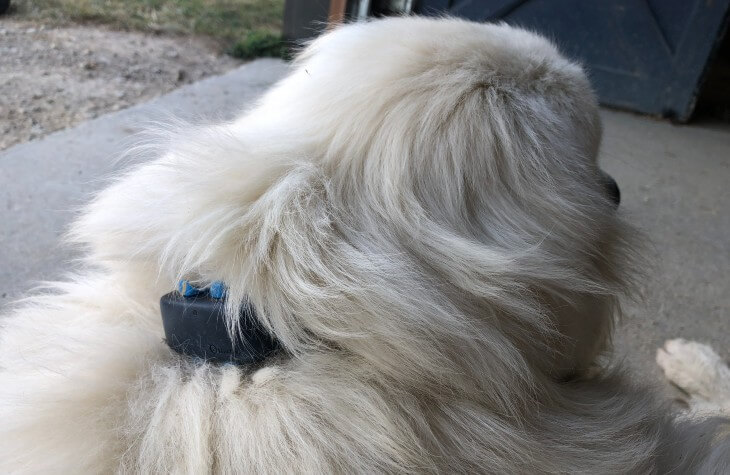
Image: Cathy Habas, SafeWise
To write this Tractive review, we got a Tractive Dog Tracker with a Premium subscription. Since my dogs spend all their time sleeping at my feet and never run off, I asked my friend if I could track her free-roaming farm dog, Kiki. Kiki exposed the Tractive to plenty of dirt, pond water, and early October temps. I used all the app’s features to test their performance and read through Tractive’s help guides if I had any questions. Learn more about how we review products on the Safewise methodology page.
Related articles on SafeWise
*Product prices and availability are accurate as of post date and are subject to change. Any price and availability information displayed on Amazon at the time of purchase will apply to the purchase of this product. Safewise.com utilizes paid Amazon links.
Certain content that appears on this site comes from Amazon. This content is provided “as is” and is subject to change or removal at any time.
Recent Articles

